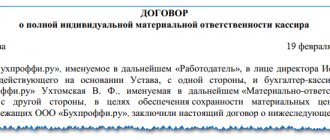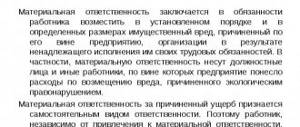Conditions for bringing an employee to financial liability
An employee may be held financially liable if:
- direct actual damage (Article 238 of the Labor Code of the Russian Federation);
- unlawful behavior of an employee (part 1 of article 233 of the Labor Code of the Russian Federation);
- the employee’s guilt (Part 1 of Article 233 of the Labor Code of the Russian Federation).
At the same time, the employee’s financial liability is excluded in cases of damage arising due to:
- force majeure (natural disaster, man-made disaster);
- normal economic risk (the actions of an employee corresponding to modern knowledge and experience, when the set goal could not be achieved otherwise, the employee properly fulfilled his job duties, showed a certain degree of care and prudence, took measures to prevent damage, and the object of risk was material values, not the life and health of people);
- emergency or necessary defense;
- failure by the employer to fulfill the obligation to provide appropriate conditions for storing property entrusted to the employee (Article 239 of the Labor Code of the Russian Federation).
Procedure for collecting material damage
To recover damages from an employee or a group of employees, the employer must:
- conduct an inventory of property in the organization and identify lost or damaged property (clause 27 of the Accounting Regulations, approved by Order of the Ministry of Finance of Russia dated July 29, 1998 N 34n);
- order an official investigation, create an internal investigation commission, establish the reasons for loss or damage to property (Part 1 of Article 247 of the Labor Code of the Russian Federation);
- demand from the employee written explanations of the reasons for the damage. In case of refusal or evasion of the employee from providing the specified explanation, draw up an appropriate act (Part 2 of Article 247 of the Labor Code of the Russian Federation);
- determine the amount of damage based on actual losses at market prices on the day the damage occurred, but not lower than the value of the property according to accounting data (including wear and tear) (Part 1 of Article 246 of the Labor Code of the Russian Federation);
- if the damage was caused by several employees, it is necessary to determine the degree of guilt and the amount of responsibility of each employee.
During the inspection, as well as after its completion, the employee and (or) his representative have the right to get acquainted with all inspection materials and appeal them (Part 3 of Article 247 of the Labor Code of the Russian Federation).
Principles for drawing up an order for a full MO
This document regulates the principle of imposing on a person the obligation to compensate for swearing. damage in full if the damage was caused by the actions of this particular employee.
There are two standard types of orders for full financial responsibility - this is used for a number of persons (team, brigade, unit) and for an individual (individual form).
An order is drawn up by the head of the institution in any form, but must contain the following information:
- information about the enterprise, its forms of activity;
- the date of execution of the document and the period during which the financial guarantee will be legally valid (one-time form or permanent);
- information about the employee or group of persons (by name), his (their) position;
- an indication of the legal norm that provides for the full format of obligations for a specific position or type of activity;
- information about valuables (their types, quantity, price) that will be imputed to the worker under the guise of a property order;
- a point where it will be indicated that this particular form of liability will be applied to a citizen or group of persons, that is, that in the event of harm, compensation will be recovered from a certain person (group), the amount of which will correspond to the actual amount of damage caused;
- information about the persons who are entrusted with the obligation to carry out an inventory and transfer the property charged under responsibility to a specific person in respect of whom the order is being formed;
- appointment of a person who undertakes to form an agreement assigning full responsibility to the employee or team;
- information about the official who will determine the principles of maintaining accountable property.
An example of a document in the photo below:
To what extent is an employee financially liable for damage caused to the employer?
In accordance with Art. 241 of the Labor Code, the employee bears financial liability for damage caused to the employer within the limits of his average monthly earnings, unless otherwise provided by the Labor Code or other federal laws.
An employee who causes damage to the employer may be subject to either limited or full financial liability.
Limited financial liability is the main type of financial liability of an employee for damage caused to the employer. It consists in the employee’s obligation to compensate for direct actual damage caused to the employer, but not in excess of the maximum limit established by law, determined in relation to the amount of wages he receives.
The use of limited liability within the limits of average monthly earnings means that if the amount of damage exceeds the employee’s average monthly earnings, he is obliged to compensate only that part of it that is equal to his average monthly earnings. In other words, the employee is obliged to fully compensate for direct actual damage caused to the employer only in cases where this damage does not exceed his average monthly earnings.
The rule of limited financial liability within the limits of average monthly earnings is applied in all cases, except for those in respect of which the Labor Code or other federal law directly establishes higher financial liability. For example, full financial liability (Article 242 of the Labor Code).
It should be borne in mind that if the employer makes a claim for compensation by the employee for damage within the limits of his average monthly earnings (Article 241 of the Labor Code), however, during the trial the circumstances will be established with which the law connects the onset of full financial liability of the employee, the court is obliged to make a decision on the requirements stated by the plaintiff and cannot go beyond their limits, since by virtue of Part 3 of Art. 196 of the Code of Civil Procedure, such a right is granted to the court only in cases provided for by federal law (clause 7 of the Resolution of the Plenum of the Supreme Court of the Russian Federation “On the application by courts of legislation regulating the financial liability of employees for damage caused to the employer”).
Full financial liability consists of the employee’s obligation to compensate the direct actual damage caused to the employer in full.
Yu. P. Orlovsky, A. F. Nurtdinova, L. A. Chikanova
From the book: 500 topical questions on the labor code
Source: SPS Consultant
Agreement on full financial responsibility
As practice shows, concluding a full liability agreement is a prerequisite for employment in many situations. Many analysts regard this fact as ignoring the legal rights and interests of employees, while other experts define this agreement as an effective mechanism for establishing normal legal relations between the employer and his hired personnel.
Nevertheless, whatever the attitude of ordinary people to this kind of agreement, the law establishes the employer’s right to sign such an agreement.
Often, agreements of this nature are concluded with those employees who, due to their official duties, will have uncontrolled access to material resources (cash, property assets).
At the same time, the main cases when an employee will bear responsibility and fulfill its basic conditions are fixed at the legislative level. In this way, the state protects hired workers who agree to conclude an agreement on financial responsibility.
Based on the legal requirements for this agreement, it should be noted that the agreement will be recognized as valid in a situation where it is signed and certified by both parties to the agreement, and also has a clearly structured form consisting of the following components:
- name of the agreement and indication of complete information about the parties to the process;
- the subject of the agreement, which specifies all the valuables that will be under the control of the hired employee, and for the safety of which he will be responsible;
- specific mechanisms and methods of compensation for potential damage are stipulated, as well as mechanisms for determining the exact amount of damage, in particular expert assessments, commission audits, etc.;
- The text of the agreement must necessarily indicate which specific cases may become the reason for the employee’s financial liability. As a rule, all the conditions noted in Art. are duplicated here. 243 Labor Code of the Russian Federation;
- additional conditions are specified, for example, the possibility of terminating the agreement, the legal basis for resolving disputes, etc.;
- At the end of the agreement, the details of the parties are indicated and their signatures are affixed.
It is legally determined that all the requirements specified in the Labor Code of the Russian Federation must be complied with by the parties to the process when signing the agreement. Otherwise, the contract may be considered void and will have no legal force.
It has also been established that specific specialties have their own standard agreements. For example, samples of financial liability agreements for sellers and cashiers, drivers and forwarders, warehouse managers, storekeepers and accountants have been approved by law.
Positions with full financial responsibilities
The Federal Law of the Russian Federation predetermines professions, positions and individual works that are subject to compensation in full if financial losses are caused to the employing organization, among them the categories of main defendants are distinguished:
- directors, their deputies and managers at enterprises;
- cashiers, accountants and other employees whose work involves storing and carrying out certain manipulations with funds;
- storekeepers, merchandisers who issue goods;
- caretakers, whose obligations include storing the institution’s material assets;
- senior nurses and housekeepers in medical institutions;
- specialists involved in servicing cash and trading equipment;
- forwarders;
- collectors;
- specialists involved in the reception, storage, issuance and movement of certain resources (commodity or money), regardless of the type of activity of the organization in which the person works;
- people whose job responsibilities include collecting, restoring or preserving things of cultural and everyday value;
- employees engaged in trading activities, regardless of the type of trading enterprise;
- specialists involved in preparing, sending or accompanying cargo, postal shipments, cash or other things of material value.
Responsibilities of employees charged with full MO
A person who enters a job with the condition of bearing a certain type of financial guarantee must fulfill his direct labor duties in accordance with the requirements of the position and not violate the established internal regime of the institution.
- Bear responsibility in accordance with the signed agreement, which must be drawn up in two copies, one of which is kept by the person responsible.
- Adhere to the rules established by the job description. Coordinate with management any manipulations that go beyond the scope of the provided authority. In the event of damage to the organization, the employee must compensate for the damage in the financial equivalent provided for in the form of material obligations.
Full financial responsibility is a rather serious working condition, and in order not to become a victim of the employer’s dishonesty or one’s own ignorance , one should be interested in the laws and strictly adhere to all the requirements provided for by law.
If there are any doubts about the employer’s requirements, it is better to contact specialists who can protect the rights of an ordinary worker.
If you find an error, please select a piece of text and press Ctrl+Enter.







